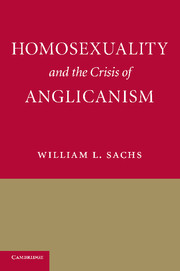Book contents
- Frontmatter
- Contents
- Acknowledgements
- 1 A definitive moment
- 2 The shape of early Christian unity
- 3 When ideals encounter realities
- 4 Reform and the power of the periphery
- 5 Anglican tradition and local prerogative
- 6 The triumph of indigenous Anglicanism
- 7 The rise of Liberalism
- 8 In search of the pure church
- 9 Beyond warring parties?
- Index
- References
9 - Beyond warring parties?
Published online by Cambridge University Press: 05 June 2012
- Frontmatter
- Contents
- Acknowledgements
- 1 A definitive moment
- 2 The shape of early Christian unity
- 3 When ideals encounter realities
- 4 Reform and the power of the periphery
- 5 Anglican tradition and local prerogative
- 6 The triumph of indigenous Anglicanism
- 7 The rise of Liberalism
- 8 In search of the pure church
- 9 Beyond warring parties?
- Index
- References
Summary
THE EROSION OF UNITY
Few persons could acquire more vivid images of Anglican life than an archbishop of Canterbury. Holding that office when he did, George Carey saw with particular clarity the rise of the conflict over homosexuality. Recalling his first visit to the United States as archbishop, Carey lamented much in the Episcopal Church. English bishops, he concluded, “had the edge … in terms of theological ability and intellectual vigour.” Even more, the English bishops were better able “to work as a united body, in spite of differences of outlook and theology.” He expressed admiration for then Presiding Bishop Edmund Browning, but noted that in his “great desire to express an inclusive gospel, Ed led with his heart.” Time and again these qualities in the American church proved troubling to Carey: less than desired theological substance and a tendency to lead with one's heart. Above all, the American church seemed at a loss to find an adequate approach to unity. Carey was troubled by this insufficiency.
Carey found much to praise in the Episcopal Church and counted himself as its friend. His memoir bespeaks a man who felt at home in the United States and probed thoughtfully beneath its surface. Repeatedly Episcopal churches and their leaders were praised for their warmth, but even more, for the substantial programs they maintained. But American religious attitudes could surprise Carey.
- Type
- Chapter
- Information
- Homosexuality and the Crisis of Anglicanism , pp. 220 - 250Publisher: Cambridge University PressPrint publication year: 2009



